Session 2: Space Technology
Moderator
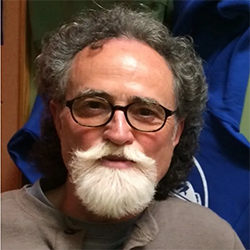
DeWayne Cecil, Director, Destination SPACE (Satellite Program for Aerospace-Centered Education)
Dr. L. DeWayne Cecil founded Destination SPACE in March 2017 with a vision of providing students with space-related interactive science education. As the chief scientist of Destination Space, Cecil draws upon his extensive background in applied earth sciences and remote sensing. After earning a Ph.D. in earth science from the University of Waterloo in Ontario, Canada, Cecil went on to serve as chief scientist of the Applied Sciences Program at NASA Headquarters and as senior science advisor at NASA Langley’s Systems Engineering Office, ‘Lead Applications Scientist at the USGS ‘s Global Change Research Program, and the first Western Region Climate Services Director at NOAA’s National Centers for Environmental Information (NCEI). In 2015, he formed Sustainable earth Observation Systems, LLC (SeOS). SeOS consults with NASA, NOAA and the Center for the Advancement of Science in Space (CASIS) for the commercialization of the International Space Station U.S. National Laboratory’s space research and applications. Cecil is also the chief climatologist for Global Science & Technology, Inc.
Panelists
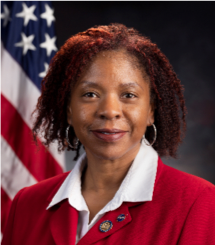
Julie Williams-Byrd, Acting Chief Technologist, NASA Langley Research Center
Julie Williams-Byrd is an electro-optics engineer at NASA Langley Research Center. As NASA Langley’s acting chief technologist, Williams-Byrd advises its director and senior staff on technology matters and provides technical leadership for planning, management and evaluation of comprehensive, centerwide technology development activities with an emphasis on early stage technologies. She also leads and performs technology development related studies and performs data analysis for the NASA chief technologist at NASA Headquarters. Prior to becoming acting chief technologist, she was deputy chief technologist and before that, she led the Space Mission Analysis Branch’s Technology Assessment and Integration team. This team performed technology assessment, integration and prioritization activities for various NASA human exploration-based architecture studies. Williams-Byrd also has extensive expertise in developing solid-state laser systems for remote sensing of the atmosphere. Williams-Byrd earned bachelor’s and master’s degrees in physics from Hampton University. She is the author of numerous technical publications and is committed to encouraging young scientists and engineers through mentoring and community outreach activities advocating careers in science, engineering, math and technology (STEM). She also is featured on the NASA Modern Figures and Woman of NASA (WON) websites.
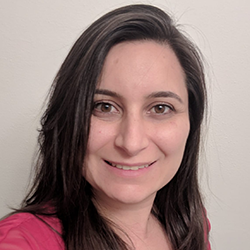
Sara Rivero-Calle, Postdoctoral Research Fellow, Center for Marine Science, University of North Carolina at Wilmington
Sara Rivero-Calle is a post-doctoral research fellow at the Center for Marine Science at the University of North Carolina Wilmington. After completing her bachelor’s in biology at Universidad Complutense de Madrid in Spain, she received two graduate degrees in biological oceanography: a master’s from the University of Puerto Rico based on sponge ecology in mesophotic coral reefs, and a Ph.D. from Johns Hopkins University, where she studied long-term dynamics of North Atlantic plankton. Rivero-Calle conducts research in biological Oceanography, Satellite Remote Sensing, Modeling and Phytoplankton Ecology. She is currently working on a cutting-edge project funded by the Gordon and Betty Moore Foundation to launch into space the first ocean color CubeSat (or nanosatellite).
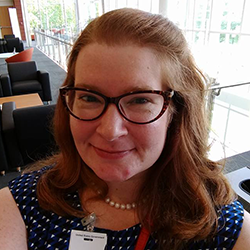
Julie Hoover, Faculty, Durham Technical Community College (2018–19 NC Space Grant Team Competition Award Recipient)
Julie Hoover has been a geology and GIS professor at Durham Tech for the last 15 years. She has a weakness for huge projects, especially when they involve sending something to space. She has lead four NASA Swarmathon teams, three NC Space Grant High-Altitude Balloon teams and three High-Altitude Student Payload projects. Her research includes experiments in greenhouse gas collection, hacked cameras, remote sensing of nonpoint source freshwater plastic pollution, solar glare, computer vision, swarm robotics and satellite servicing technology. She is a passionate advocate for science education and community outreach.
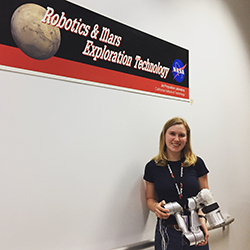
Katherine Tighe, Undergraduate Student, Mechanical Engineering, Duke University (Summer 2018 NC Space Grant Intern at NASA Jet Propulsion Laboratory)
Katherine Tighe is a junior at Duke University studying mechanical engineering. For the past three summers, she has interned in the robotics group at NASA’s Jet Propulsion Laboratory. There, she worked on projects for the Mars Sample Return mission including designing, assembling, and testing a prototype robotic arm for sample retrieval. This past summer, she also served as the co-captain of the JPL Aerospace Games ultimate frisbee team, ending the tournament as champions. At Duke, Tighe helps represent her fellow engineers as part of Engineering Student Government, where she serves as the chair for major events including E-Ball, the 2017 winner of Best Social Event from the National Association of Engineering Student Councils. This was her first year as a North Carolina Space Grant scholar, and she is excited to share her work at the 2019 SPACE Symposium.